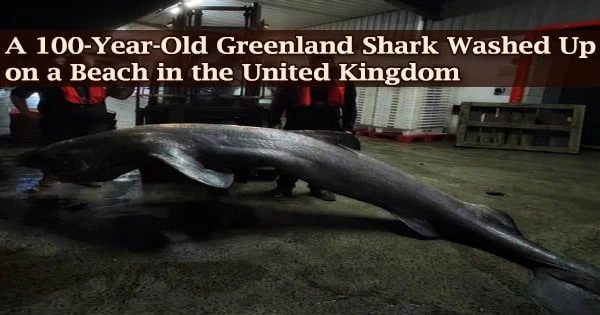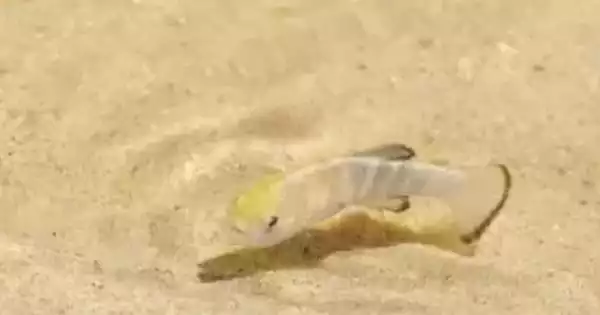A rare Greenland shark washed up on a British beach and is thought to be at least 100 years old, but specialists aren’t sure how it got there.
On March 13, 2022, a dead shark was discovered on the beach in Newlyn Harbour, Cornwall, on England’s southwest coast. According to Cornwall Wildlife Trust Twitter posts, the tide came in and dragged the carcass back out to sea before scientists could examine it.
On March 15, a recreational boating business named Mermaid Pleasure Trips discovered the shark floating off the coast of Cornwall and brought it back to shore. Greenland sharks are rarely seen in the United Kingdom, and this is only the country’s second recorded stranding.
“Even though it’s a sad event when these beautiful, spectacular animals do strand on our beaches, it’s such a valuable opportunity for us to study them,” Abby Crosby, a marine conservation officer who manages the marine strandings network at the Cornwall Wildlife Trust, told Live Science.
The Greenland shark (Somniosus microcephalus), also known as the gurry shark, grey shark, or by the Kalaallisut name eqalussuaq, is a big shark belonging to the Somniosidae (“sleeper sharks”) family. It is closely related to the Pacific and southern sleeper sharks. Because individuals are rarely recovered, measuring the Greenland shark’s growth rate is difficult.
Even though it’s a sad event when these beautiful, spectacular animals do strand on our beaches, it’s such a valuable opportunity for us to study them.
Abby Crosby
These sharks have the longest known longevity of any vertebrate species (between 250 and 500 years) and are among the largest extant shark species. It is a generalist feeder, eating a wide variety of foods.
Greenland sharks can be found up to 8,684 feet (2,647 meters) below the surface of the Arctic and North Atlantic waters, according to the International Union for Conservation of Nature (IUCN). These sharks could live for at least 272 years, according to a 2016 study published in the journal Science, but scientists still have a lot to learn about the elusive species.
The Greenland shark is not only found in Greenland, despite its name. Because this shark, also known as the gray, ground, gurry, or sleeper shark, dwells in extremely cold, deep waters, it has received far less research than many of the more than 500 other shark species. Greenland shark flesh, which has been processed to minimize toxic levels, is a delicacy in Iceland known as kæstur hákarl.
These sharks conserve energy by swimming slowly (approximately 1.12 feet per second), but they may also ambush prey with quick bursts of speed. A juvenile female shark washed up in Cornwall, measuring 13 feet (4 meters) long and weighing 628 pounds (285 kilograms).
According to a 2016 study, Greenland sharks normally become sexually mature when they are roughly 150 years old, though experts have yet to determine the shark’s age. According to the St. Lawrence Shark Observatory (ORS), the creatures continue to grow as they age, and adults can reach a length of 24 feet (7.3 meters).
On March 16, a veterinary pathologist from the Cornwall Marine Pathology Team performed a postmortem on the shark for the Cetacean Strandings Investigation Programme (CSIP), a national program that works with the Marine Strandings Network of Cornwall Wildlife Trust.
“It looked like it probably live-stranded,” Barnett told Live Science. In other words, the shark was still alive when it washed up, and it died on the beach. “It obviously hadn’t eaten for some time,” Barnett said. “The stomach was totally empty.”
The shark appeared to have septicemia, a blood infection, according to Barnett, although it’s unclear why the shark wasn’t feeding and ended up in shallow waters near Cornwall. Marine animals become stranded and die on beaches for a variety of causes, including sickness, but the movement of ocean currents and other marine circumstances also play a role in transporting living and dead species to shore.
“The majority of our strandings are common dolphins and porpoises, and they would have all died within a kilometer (0.6 mile) of our coastline, if that,” Crosby said.
Greenland sharks typically swim far from the coast, so being swept in by the correct current and weather circumstances is quite unlikely, she added.
According to Barnett, this is the first time a Greenland shark has been necropsied in the United Kingdom. “They are a species that we just don’t encounter,” he said.
Greenland shark research, such as studies into their life history and diet, will benefit from the samples taken from the shark, according to Rob Deaville, project manager for CSIP at the Zoological Society of London.
















